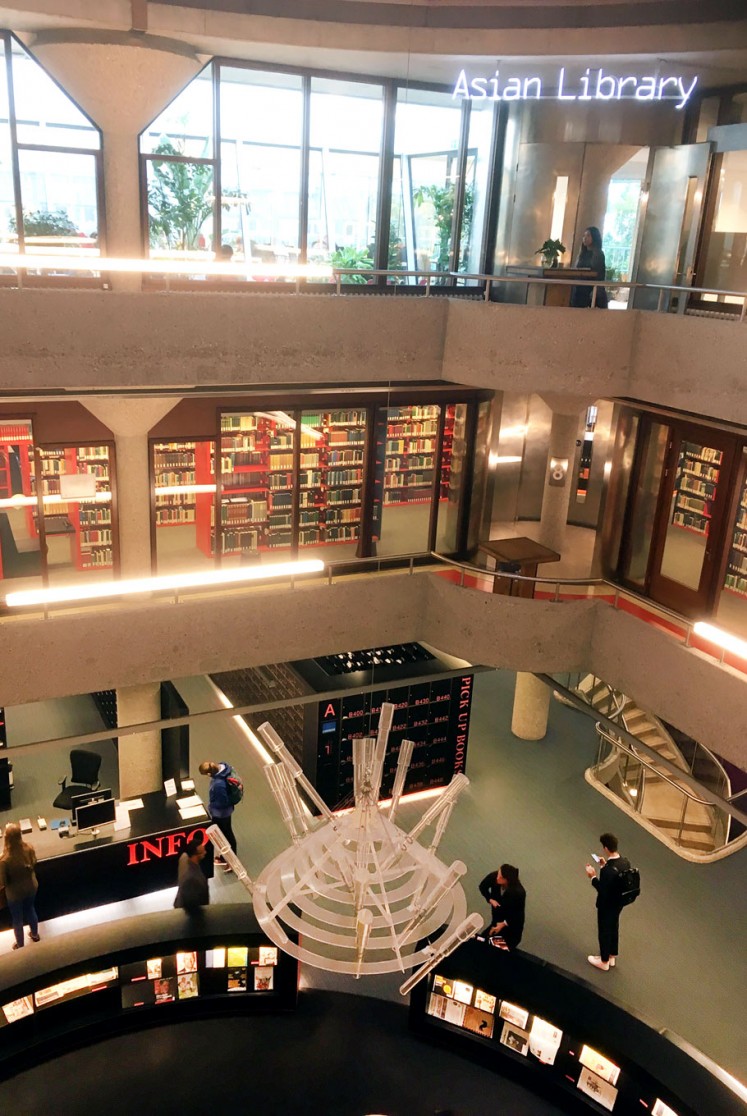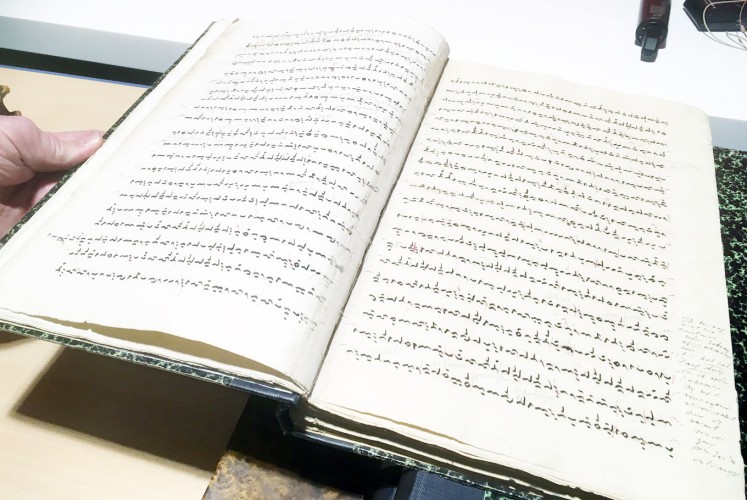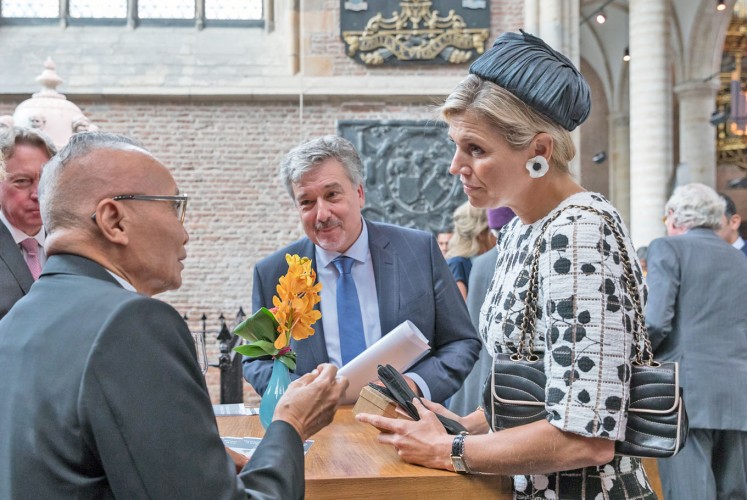Popular Reads
Top Results
Can't find what you're looking for?
View all search resultsPopular Reads
Top Results
Can't find what you're looking for?
View all search resultsWorld's largest library on Indonesia opens in Leiden
Change text size
Gift Premium Articles
to Anyone
Q
ueen Máxima of the Netherlands inaugurated in Leiden last week the Asian Library, which houses the world’s largest collection on Indonesia, including two United Nations Educational, Scientific and Cultural Organization (UNESCO) heritage documents.
Rain and biting cold could not stop thousands of peoplefrom royalty and diplomats to academics and students — from descending upon Leiden’s city center for the opening of Leiden University’s Asian Library.
“Leiden University has created one of the foremost Asian libraries and a major international center for the study of Asia,” said university head librarian Kurt De Belder at the opening ceremony.
While also housing a prominent Chinese, Japanese, South and Southeast Asian collection, its Indonesian section is the library’s crown jewel.
“The Asian Library has the largest Indonesian collection worldwide,” De Belder points out, with “hundreds of thousands of items such as of books, documents, maps, photos and even LPs of early Indonesian pop music.”
The library is part of Leiden University Libraries, with collections spread across seven locations: in Leiden, Morocco’s Rabat and Jakarta. It brings together the university’s existing Asian collection with the libraries of the Royal Tropical Institute, which closed in 2013, and that of the Royal Netherlands Institute of Southeast Asian and Caribbean Studies KITLV. The latter, in particular, has long been a major source for academic researchers on Indonesia. The Jakarta location is also a KITLV center.
It took several years of tremendous preparatory work, De Belder continues, to create “a large open stack collection of 4 kilometers of Asian materials at the University Library, an additional book depository with 38-km of shelf space allowing all of the Asian collections, more than 30-km, to be housed at the University Library, and ultimately creating an Asian Library on the library’s former roof garden.”
Situated on the third floor of Leiden University’s library building, the Asian Library has surrounding windows overlooking the city’s canal and a 16thcentury botanical garden. Its facilities include conference rooms and a film hall.
Among its most treasured items are original copies of La Galigo and Babad Diponegoro, both on UNESCO’s Memories of the World Heritage list. La Galigo, the world’s largest literary work, is a 14th century mythical story from the Bugis in South Sulawesi. Originating from an oral tradition, it was put down in writing around the 19th century. “We have 12 volumes of the work in our collection,” says Roger Tol, head of the KITLV Jakarta office.
Babad Diponegoro, meanwhile, is the autobiographical chronicle of Prince Diponegoro, who fought the Dutch colonizers in a five-year war ending in 1830.
Tol underlined that both works were jointly submitted for UNESCO’s consideration by Indonesia and the Netherlands. Former Indonesian education minister Wardiman Djojonegoro, who has been involved in the submission process, was among the day’s honored guests.
A third submission is on the way: the 13th century Panji tales from East Java, which later spread throughout Southeast Asia. The Asian Library has some 250 Panji manuscripts, “more than any collection elsewhere in the world,” Tol says.
Read also: Great Indonesian literature: Tales of Panji
The deputy chief of mission at the Indonesian Embassy in The Hague, Ibnu Wahyutomo, was optimistic that the new Asian Library would encourage more Indonesian academics to head to the Netherlands. “We already have some 2,500 students studying here,” he said.
He pointed out that some of Indonesia’s most prominent figures are Leiden University alumni, such as sultan Hamengkubuwono IX, who studied at the School of Economics in the 1930s. This head of the powerful Yogyakarta sultanate played an important role in Indonesia’s road toward independence from the Dutch in the 1940s. He served as vice president in the 1970s under then president Soeharto.
Book talk: Queen Máxima of the Netherlands (right) converses with former Indonesian education minister Wardiman Djojonegoro (left) after the Asian Library opening ceremony at the St. Pieters church in Leiden. Between them is Leiden University chief librarian Kurt de Belder. (Leiden University/Monique Shaw)In fact, also present at the opening were two of the sultan’s granddaughters: crown Princess Mangkubumi and her youngest sister Princess Bendoro. Head librarian De Belder said he was delighted to welcome the two royals. “They are actively involved in the museum community of Yogyakarta, and are interested in sharing and exchanging information with us.”
One very important mission of the library is its continuous digitalization efforts, so that people anywhere in the world with internet could view its collection. “We would like to share this great collection with the world,” De Belder said.
Marije Plomp, librarian for the South and Southeast Asian collection, explains that “anyone with internet access can get on our website and search for material. The site is available in English, and when you click on a title, it will say whether it’s available in digital form.”
Some of the material, Plomp continues, “can also be downloaded for free, given that there is no copyright on it.” Much of the material dated prior to the 20th century, she points out, does not have copyright on them.
In the past decade, Plomp has seen a significant increase in interest for information from Indonesia. “Many Indonesians are curious to do research about their village or city, and about their history.”
A concrete proof of this is the presence of Bogor Mayor Bima Arya at the Asian Library opening.
“I’ll be signing a MoU [memorandum of understanding] for information exchange between Bogor and Leiden,” he said after the opening ceremony.
Bima says Bogor is mapping out its modern history, as well as that of the Pajajaran Kingdom, which existed in the Bogor region between the 11th and 16th centuries.
“I am sure that there are many resources here that we can use for our research.”
Plomp applauds these efforts. “After all, a lot of what we have here is our shared heritage with Indonesia.”
She does give one word of advice: “Historical research takes a lot of time and effort. No one should expect to promptly get all the material they need. They need to be patient and sort out what they need.”
The new library, she points out, does have four slots for guest researchers to go to Leiden and use the library’s facilities for a few months.
“We currently have two Indonesian writers here: Ben Sohib and Kurnia Effendi.”














